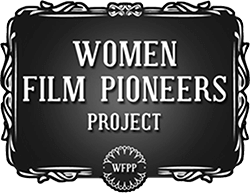CFP: Feminist Media Histories Special Issue on Curating Feminist Film Archives
Guest Editors: Maggie Hennefeld and Laura Horak, co-curators of Cinema’s First Nasty Women
DEADLINE: November 15, 2022
“The loss of stories sharpens the hunger for them.”
—Saidiya Hartman, “Venus in Two Acts” (2008).
“Let us not begin at the beginning, nor even at the archive. But rather at the word ‘archive.’”
—Jacques Derrida, Archive Fever: A Freudian Impression (1995).
Let us begin, instead, with the word “curate,” whose etymology extends from medieval priesthood (curatour, “a parish priest”) and from the “curing of disease, restoration of health” (in Old French) and now denotes the authority “to select and organize artistic works for presentation in something such as an exhibit, show, or program.” This special issue of Feminist Media Histories is dedicated to sharing stories about the revival of forgotten feminist film archives. We approach the task of curation beyond its official job designation (of “curator”) to include anyone whose labor involves curating feminist archives (as educators, activists, artists, web designers, librarians, or museum and gallery workers). We define “feminist” broadly and intersectionally—as anti-racist, anti-colonial, queer, trans, and crip. By “films” we mean reels of celluloid, but also digital and video audiovisual works. “Archives” refer not only to institutions that preserve celluloid and other material artifacts (although they are also those!), but to any gathering of surviving films along with media traces that once existed but are no longer extant. Curating feminist film archives might even involve applying a feminist lens to collections that would not ordinarily be viewed in such a frame.
Feminist film curators of the twenty-first century have cultivated imaginative and playful ways to navigate the loss, fragmentation, and repeated erasures endemic to the material preservation and collective memory of cinema. Writing forgotten women and other marginalized “makers” back into film history has been a rallying cry of the field of feminist historiography, exemplified in writings by Giuliana Bruno, Jane Gaines, Usha Iyer, Debashree Mukherjee, Shelley Stamp, Jacqueline Najuma Stewart, Patricia White, Yiman Wang, Zhen Zhang and many others. In some cases, this work involves reclaiming otherwise uncredited creative labor. In others, this endeavor has taken a vividly “speculative” and often reparative or fabulative turn, as pursued in a recent FMH double-issue edited by Allyson Nadia Field, as well as in Alix Beeston and Stefan Solomon’s forthcoming volume, Incomplete: The Feminist Possibilities of the Unfinished Film.
True to form, feminist film curating exceeds traditional methods in academic scholarship. Examples run the gamut from digital networks (The Women Film Pioneers Project, Kin Theory, Rise Up!, Edited By, and New Directions in Film Historiography) to archival film festivals (In Visible Colors Remediated, Orphan Film Symposium, and FIC-Silente), as well as DVD/Blu-ray releases (Kino’s Pioneers: First Women Filmmakers and Pioneers of African-American Cinema), online compendia (Another Gaze’s Another Screen and Maya Cade’s Black Film Archive), and gallery exhibitions such as HKW’s No Master Territories and BAMPFA’s The Future Is Feminist. These projects often involve non-traditional forms of academic labor that question university hierarchies and what “counts” as research in the humanities, arts, and social sciences. In that spirit, feminist and queer filmmakers—Cecilia Barriga, Zoe Beloff, Zeinabu Irene Davis, Assia Djebar, Zackary Drucker, Cheryl Dunye, Azza El-Hassan, Su Friedrich, Barbara Hammer, and Karen Pearlman—frequently draw on the remains of the archive to envision lost or impossible counter-histories of cinema and thereby to curate new feminist film futures. Last but not least, podcasts create sonic adaptations of the unheard canon, as in the queer tour-de-force The Film We Can’t See, which unearths surviving audio footage of a fictive, anti-fascist Sergei Eisenstein feature that would have co-starred Louise Brooks and Paul Robeson.
As the curators of Cinema’s First Nasty Women, a 4-disc DVD/Blu-ray set of silent-era films featuring slapstick comediennes and cross-dressing women, we are especially interested in collaborative, unorthodox, or otherwise irreverent models of feminist archival film curation in the twenty-first century. We invite submissions of traditional (which is not to say conventional) academic essays (which will be sent for blind peer review) AND shorter-form creative experiments: interviews, roundtables, personal essays, anarchic poetry, feminist dithyrambs, polemical manifestos.
Potential contributors, please send a 300-word abstract along with a brief bio to the guest editors, Maggie Hennefeld (mhennefe@umn.edu) and Laura Horak (LauraHorak@cunet.carleton.ca), no later than November 15, 2022. Contributors will be notified by December 15, 2022; article drafts will be due by April 15, 2023 and will then be sent out for anonymous peer review.
